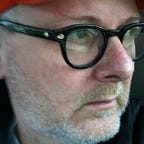The Art of Humility
It’s one of those journey-not-a-destination kind of things
Recently, I had heard Dr. Robert J. Wicks on the podcast called Encountering Silence. The Loyola University professor was talking about his book on humility called The Tao of Ordinariness. I was very impressed because what he was saying rang true in this current age of social media braggadocio, and brought me solace. In the book he writes, “Ordinariness is…a comfort with one-self.” This is fostered through solitude; a willingness to seek the help of others; and a lack of egoism, but also a mindset which honors one’s own talents, and those of others, who are to be encouraged. This, in turn, made me seek out A.G. Sertillanges’ incredible book The Intellectual Life, which is probably the most important book to inform my own intellectual sojourn. Late in the book, the author gives considerable space to St. Thomas Aquinas, the Italian Dominican friar/philosopher, in a section of the book on “Creative Work” called ‘Attempting Nothing beyond One’s Power,’ easily the most salient section to address my particular needs as a creative writer with a PhD. “Altiora te ne quaesieris, do not seek things above you,” Sertillanges quotes the 13th century thinker. Via this precept, one of Aquinas’ 16, the author advocates, implores, intellectuals to, “[t]ake the measure of all things with humility and confidence.” He writes that one should not force destiny; to allow instead; to use discernment as your guide. You be you, I might paraphrase. “You alone can do well what is laid upon you; you would do badly what your neighbor will do well. God is satisfied in all,” Sertillanges writes.
“Altiora te ne quaesieris, do not seek things above you,” — St. Thomas Aquinas
Never short on confidence, I am often brought to my knees and humbled by reality to such an exhausting extent that a few years ago I agreed that rather than be its incessant slave I would cultivate humility, and embrace ordinariness in order to be more comfortable with myself. I’ve exited myself from social media, stopped “Googling,” my competitors, and adopted a motto: Private. Quiet. Slow. It is an ongoing cultivation, so strong is my ego and its arrogance. Often in my creative work and intellectual endeavors I have to stop what I’m doing to remind myself, I am not James Joyce; I am not (name of my nemesis redacted out of sheer embarrassment).
I think the most successful amongst us (but at a social distance) embrace humility as a guiding principle; or, if not humility, are sufficiently satisfied with themselves (that comfort, Wicks advocates) there’s no need, no desire, to compare themselves to others.
For me, it is a destination still, a far off place some days, just around the corner, on others. Being aware at the very least gets me on the journey on a road, to butcher Antonio Machado, made by walking. You have to walk the walk.
Sertillanges writes, “Success in every order is always attained on the same conditions: to reflect at the start, to begin at the beginning, to proceed methodically, to advance slowly…” That’s me, I remind myself, again and again and again…I’m trying to ignore the hare.
Private. Quiet. Slow.
